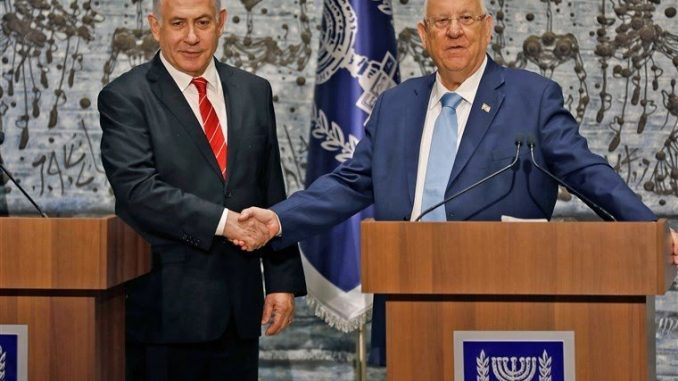
Israeli President Reuven Rivlin on Wednesday tapped Prime Minister Benjamin Netanyahu of the right-wing Likud party to form a new government after receiving the final results of last week’s deadlocked election.
“The people of Israel don’t want new elections,” said Rivlin, after handing the mandate to Netanyahu. “Parties will need to compromise.”
Netanyahu, already Israel’s longest serving prime minister, now has 42 days to try and cobble together a government. If he fails to do so the opportunity could pass to the next candidate who the president thinks has the greatest chance of forming a government.
Israeli presidents are responsible for picking prime minister candidates after elections. The process is usually a formality but has recently become much more complicated since neither Netanyahu nor former three-star general Benny Gantz from the centrist Blue and White party can build a stable parliamentary majority on his own.
three hurdles: an economic one, the long-awaited Trump administration peace plan and the opportunity to define and secure the country’s borders.
For Netanyahu there is more than simply his political career at stake. If he manages to form a government it may be possible for him to pass legislation that would grant him immunity. Israel’s attorney general is expected to decide whether to formally charge the prime minister by the end of the year, after a pre-trial hearing in October.
In any case, Netanyahu is running out of time to pass legislation as the hearing is slated to start on Oct. 2.
“Very shortly these proceedings will begin making it virtually impossible for him to form a coalition government that would enable legislation to proceed that would stop those legal proceedings,” said David Halperin, executive director of the center-left Israel Policy Forum.
The final results released Wednesday saw the Likud party add an extra seat in Parliament, raising its total to 32 out of the 120 seats, one behind Blue and White’s 33. But since the Likud’s gain comes at the expense of an allied ultra-Orthodox party, it didn’t change the total of 55 lawmakers who support a Netanyahu government compared to the 54 who back Gantz.
Netanyahu failed to secure a clear election victory for the second time in five months. To form a governing coalition in Israel, a candidate needs 61 seats out of the 120-seat Israeli Parliament, or Knesset.
When Netanyahu failed to form a coalition government in May he dissolved Parliament, triggering last-week’s snap election, but as it stands it appears unlikely that he will have the numbers to usher in a third election.
*story by NBC News